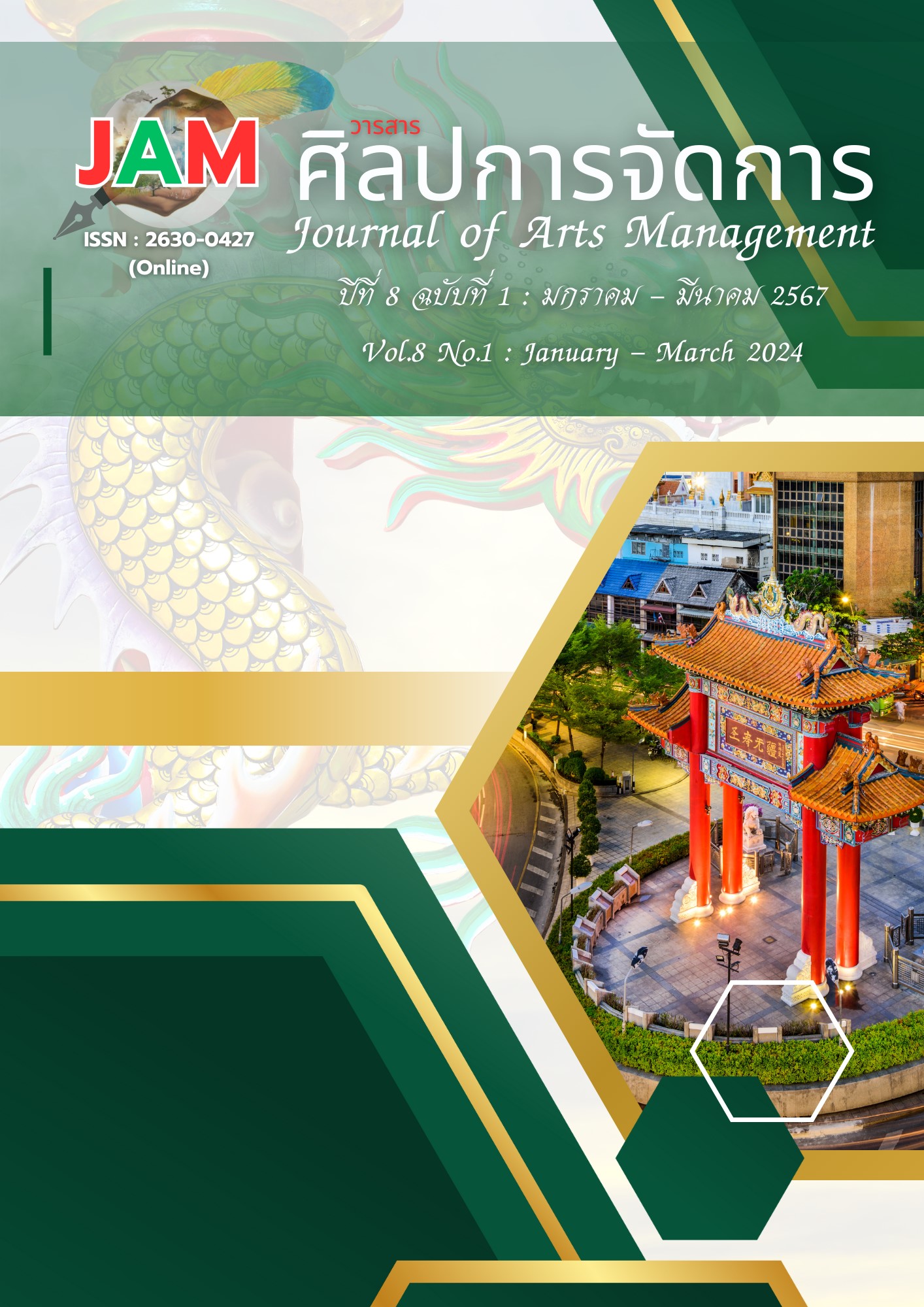Thai Language learning Management Model for Chinese Students in Private Higher Education institutions in Bangkok
Main Article Content
Abstract
This research aimed to study the Thai language learning management model for Chinese students studying in private higher education institutions in Bangkok. The research procedure was divided into three steps. Step 1: Study the administrative conditions of Thai language learning for Chinese students studying in private higher education institutions in Bangkok. Data were collected from 208 respondents and in-depth interviews with six key informants. The research instruments were a set of semi-structured interview forms and questionnaires. The statistics used for data analysis were percentages, mean, and standard deviation. Step 2: Create a Thai language learning management model for Chinese students studying at private higher education institutions in Bangkok. Data were collected from 208 respondents, and the draft model evaluated with 10 key informants. The research instruments were a set of questionnaires and a sketch assessment form. The statistics used for data analysis were exploratory factor analysis (EFA), confirmatory factor analysis (CFA), and Chi-square. Step 3: Evaluate the feasibility and utility of the administration model by experimenters in Thai language learning for Chinese students studying at private higher education institutions in Bangkok. Selected by purposive sampling from 20 respondents. The research instrument was a set of evaluation forms. The statistics used for data analysis were chi-squares. The research found that the Thai language learning management model for Chinese students studying in private higher education institutions in Bangkok consists of six main components: 1) Good teachers; 2) Teaching methods; 3) Teaching media; 4) Measurement and evaluation; 5) Student success; and 6) Thai language learning management processes for Chinese students consist of four steps: planning, organizing, controlling, and acting. The results of the model evaluation in terms of accuracy, propriety, feasibility, and utility overall subcomponents and indicators were consistent (p-value >.05).
Article Details

This work is licensed under a Creative Commons Attribution-NonCommercial-NoDerivatives 4.0 International License.
Views and opinions appearing in articles in the Journal of Arts of Management It is the responsibility of the author of the article. and does not constitute the view and responsibility of the editorial team I agree that the article is copyright of the Arts and Management Journal.
References
Asavapoom, S. (1994). Development of educational administration models. Chulalongkorn University.
Achinsamacharn, C. (2001). Educational administration. Bangkok Supplementary Media Center.
Chatbanchachai, S. (2006). Learning process: concepts, meanings, and lessons in Thai society. The Project to enhance learning for a happy community.
Chairerk, W. (2006). Learning characteristics and learning strategies of foreigners who study Thai as a foreign language[Master’s thesis, Chiang Mai University].
Drucker, F. P. (1980). Practice of Management. Charles E. Tuttle Company.
Good, C. V. (2005). Dictionary of Education (5th ed.). McGraw-Hill.
Hiranpradit P. (2002). Status of learning and teaching Thai language to foreigners in Thailand. Liberal Arts Major, Sukhothai Thammathirat Open University.
Hodgson, J. S. (1969). Public Administration. McGraw-Hill.
Keeves, J.P. (1988). Educational Research, Methodology, and Measurement: An International Handbook (2nd ed.). Pergamon.
Ketruang, W., Chaemchoy, S., & Chatrupracheewin, C. (2017). Learning Management Model of English Communication for students in Small-Sized Opportunity Expansion Schools. Journal of Education and Innovation, 19(3), 313–328. https://So06.Tci- Thaijo.Org/Index.Php/Edujournal_Nu/Article/View/100971
Khaemmanee, T. (2007). Teaching Science: Knowledge for Organizing an Effective Learning Process (2nd ed.). Chulalongkorn University.
Khowtakul, S. (1998). Educational psychology (4th ed.). Chulalongkorn University.
Kohren, T., Pimsan, N., & Tanawutpornpinit, S. (2020). The Learning Management Model of Curriculum for Thai Language, Thai Culture and Thai History in International Secondary Schools. Journal of Educational Review Faculty of Educational in MCU, 7(2), 242-254. https://so02.tci-thaijo.org/index.php/EDMCU/article/view/244058
Krejcie, R.V., & Morgan, D.W. (1970) Determining Sample Size for Research Activities. Educational and Psychological Measurement, 30, 607-610. https://doi.org/10.1177/001316447003000308
Mettakarunjit, M. (2010). Modern education management: people, local government organizations and government agencies (2nd ed.). Bookpoint.
Phaengsorn, R. (2022). The science of teaching Thai as a foreign language (3rd ed.). Chulalongkorn University.
Phonkul, C. (2001). A learning management model that emphasizes student-centeredness. Chulalongkorn University.
Prasitratsin, S. (2011). Project evaluation: principles and applications (2nd ed.). Samlada.
Panmanee, A. (2003). Creative psychology of teaching and learning. YAIMAI.
Srisawad, S. (2022). The Academic Administration Model in the 21st Century for Schools in Bangkok Metropolitan Administration[Doctoral dissertation, North Bangkok University].
Santiwong, T. (2007). Organization and management (9th ed.). Thaiwattanapanich.
Sararatana, W. (2005). School administrators: three dimensions of professional development towards effective administrators. Thipwisut.
Somnam, S. et al. (2009). Learning characteristics and language learning strategies of Chinese students studying Thai as a foreign language at higher education institutions. FEU Academic Review, 2(2). https://so01.tci-thaijo.org/index.php/FEU/article/view/27029
Thepkraiwun P. (2011). The Development of Collaborative Network Model for Educational Quality Management in Small Sized Primary Schools[Doctoral dissertation, Khon Kaen University].
Wiangwalai, S. (2013). Learning Management. Odeon Store.
Wiboonsri, Y. (2001). Project evaluation: concepts and practices (2nd ed.). Chulalongkorn University.
Wiboonyasarin, W. (2020). Teaching Thai as a foreign language: Concepts to practice. Faculty of Humanities and Social Sciences. Suan Dusit University. https://anyflip.com/ezyik/zccf/


